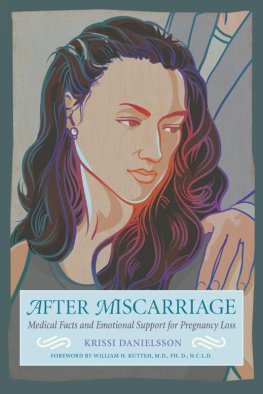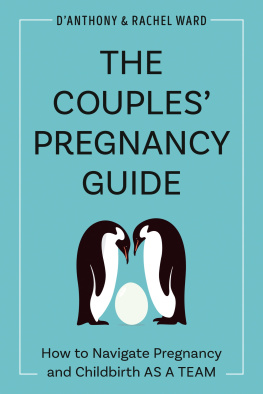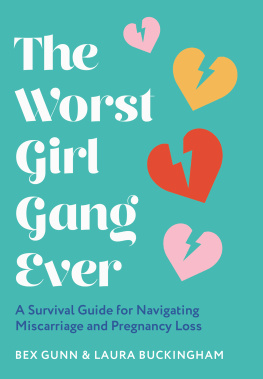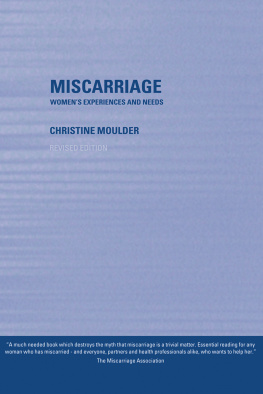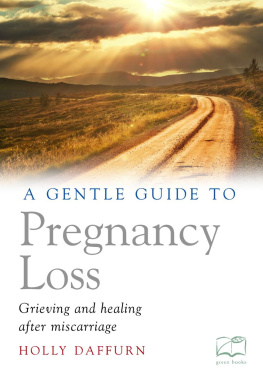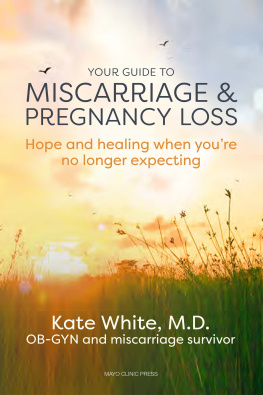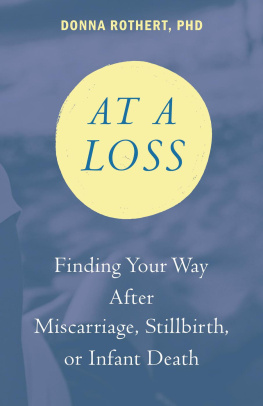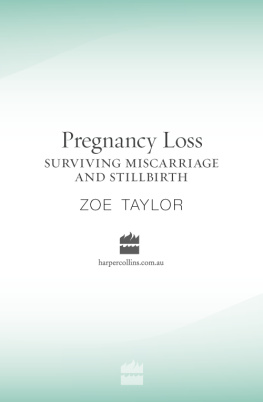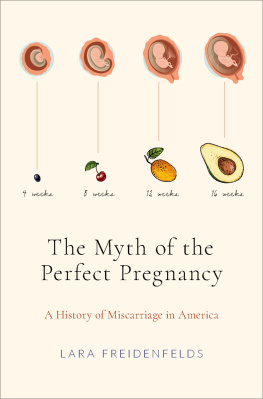The Harvard Common Press
535 Albany Street
Boston, Massachusetts 02118
www.harvardcommonpress.com
Copyright 2008 by Krissi Danielsson
Cover illustration copyright 2008 by Lane duPont
All rights reserved. No part of this publication may be reproduced or
transmitted in any form or by any means, electronic or mechanical,
including photocopying, recording, or any information storage or
retrieval system, without permission in writing from the publisher.
Printed in the United States of America
Printed on acid-free paper
Library of Congress Cataloging-in-Publication Data
Danielsson, Krissi.
After miscarriage : medical facts and emotional support for pregnancy
loss / Krissi Danielsson.
p. cm.
Includes bibliographical references and index.
ISBN-13: 978-1-55832-353-7 (hardcover : alk. paper)
ISBN-13: 978-1-55832-354-4 (pbk. : alk. paper)
1. MiscarriagePopular works. I. Title.
RG648.D32 2008
618.3'92dc22
2007025893
Special bulk-order discounts are available on this and other Harvard
Common Press books. Companies and organizations may purchase
books for premiums or resale, or may arrange a custom edition,
by contacting the Marketing Director at the address above.
Book design by Jill Weber
Cover illustration by Lane duPont
10 9 8 7 6 5 4 3 2 1
For MATT
I told you I was going to dedicate this to someone else,
but this book wouldn't be here without you.
I love you.
And don't say, "You'd better, dammit."
If You're Buying This Book for a Friend or Loved One...
I F YOU'VE NEVER BEEN THROUGH A MISCARRIAGE yourself, or even if you have, it can be hard to know what to say to someone who has just had one. As part of the research for this book, I asked women to discuss what people did for them that helped the most, and what others said that unintentionally hurt. Here are some of the comments:
WHAT HELPED:
Most people listened and told me that they knew others who had miscarried, and one friend revealed she had had a miscarriage, too, so I felt I was not alone.
M ARY
Friends who had gone through similar experiences called me to talk or offered a shoulder to cry on. My bishop also made time for me.
R HONDA
A friend has given me all her baby gear. Her belief that I will again have a pregnancy, and that it will result in a healthy baby, helps.
T INA
A few people sent cards, and to this day my mother sends me cards on Mother's Day. It helped to have the losses acknowledged.
A NITA
Just being there to let me talk, and not judging how I felt, was the best thing people did for me. One friend bought a beautiful houseplant for us; we really appreciated that.
D ESIREE
My boss gave me two weeks off and paid me for them; I didn't have to use sick leave or vacation time.
S HERRY
I received many phone calls from people in our church. It helped to know people were thinking of me and praying for me.
C ASSANDRA
My best friend came over, and we sat and talked about everything. My hopes and dreams for that child were all spoken that day, and we even named the baby. We laughed and we cried together; she shared all my emotions.
T AMMY
One friend brought dinner to my house and arranged for dinner to be sent over by others for three more nights.
G ISELLE
Another couple came to the hospital after my D&C with my favorite chocolate dessert! During my second loss, my doctor called me every day for a week and offered me his ear. That helped a lot.
H ANNAH
WHAT NOT TO SAY:
Many couples who experience miscarriages are subjected to thoughtless comments from people who probably mean well but don't understand that what they're saying not only doesn't help but may hurt the feelings of someone who has miscarried. Here are some examples of things you should not say to someone who has had a miscarriage:
- It was for the best.
- At least you know you can get pregnant.
- Something was probably wrong with it.
- Maybe God knows you're not ready to have children.
- You're trying too hard. Just relax, and it will happen.
- Take my kids for an afternoon, and I promise you won't be so sad about losing the baby.
- Maybe you should get a dog instead; they're so much easier to take care of.
- Be glad. Having a baby changes your life; think of all the fun things you wouldn't have been able to do anymore.
- You should just be happy you have one/two/three children already. You don't need any more.
- It was just a blob of cells. It wasn't a real baby.
- You're young. You'll get pregnant again.
- It happens all the time; it's nothing to worry about.
- At least you weren't very far along.
- It just wasn't meant to be.
- It probably happened because.
Preface
A S YOU PROBABLY HAVE NOTICED , medical practitioners and psychologists write most of the health-oriented books on the market. So one of the first things that may strike you when you pick up this book is that I am not a physician. I'm not a psychologist, either, although I do have an undergraduate degree in the field. At the time of this writing, I do not hold any kind of medical credential.
My perspective on miscarriage is that of a mother. I had three miscarriages in a period of 14 months when my husband and I started trying to build our family. These were my first experiences with a medical system that I had previously believed was infallible and held the answers to all health ills. When you're not a regular user of the health care system, it's easy to think that there are no more medical frontiers, that modern medicine understands the human body fairly well. I soon learned this is not the case. Although much progress has been made, many medical mysteries remain. One of these is recurrent miscarriage.
After my losses I embarked on a research mission, the first of many for me. This book is what I wish had been available when I first started on this journeya simple, unbiased collection of the known facts about miscarriage causes and treatments, followed by a discussion of coping strategies you can use as you proceed with your life. Writing this book brought back many painful memories, but I hope that it will help a lot of people.
This book should not serve as a substitute for a physician's advice. Medical decisions are individual, and yours should be made with your practitioner. Rather than being prescriptive, this book is meant to inform and empower youto give you ideas to explore with your practitioner and to help you proceed more confidently with your attempts to build your family.
I know this book can't be all things to all people. Because I experienced multiple miscarriages, I am especially sensitive to the needs of others who have had more than one pregnancy loss. If you are picking up this book after your first miscarriage, please do not be alarmed by the discussion of miscarriage causes, and please keep in mind that, after a single miscarriage, the odds are very high that the next pregnancy will be successful.
For those who have suffered multiple losses, this book will provide information about possible causes and tests that you can ask about, as well as potential treatments and current research that may result in new treatments for recurrent miscarriage.
For readers who have experienced one or several miscarriages, I also discuss the emotional aspects of coping and facing the world while grieving. When you are ready to try again, I hope you will benefit from the tips here for handling the anxiety you may experience both before and after you conceive.
Throughout the book I have included comments by women who have had pregnancy losses, and who share their feelings and offer suggestions for how to get through this painful time. I hope that these comments will let you know that you are not alone and that what you are feeling is normal. If you visit the Web site for this book, www.aftermiscarriage.com, you will find a selection of stories by women who had miscarriages and then successfully carried pregnancies to term. I hope these stories will inspire you and remind you that your story, too, will most likely have a happy ending someday.
Next page
